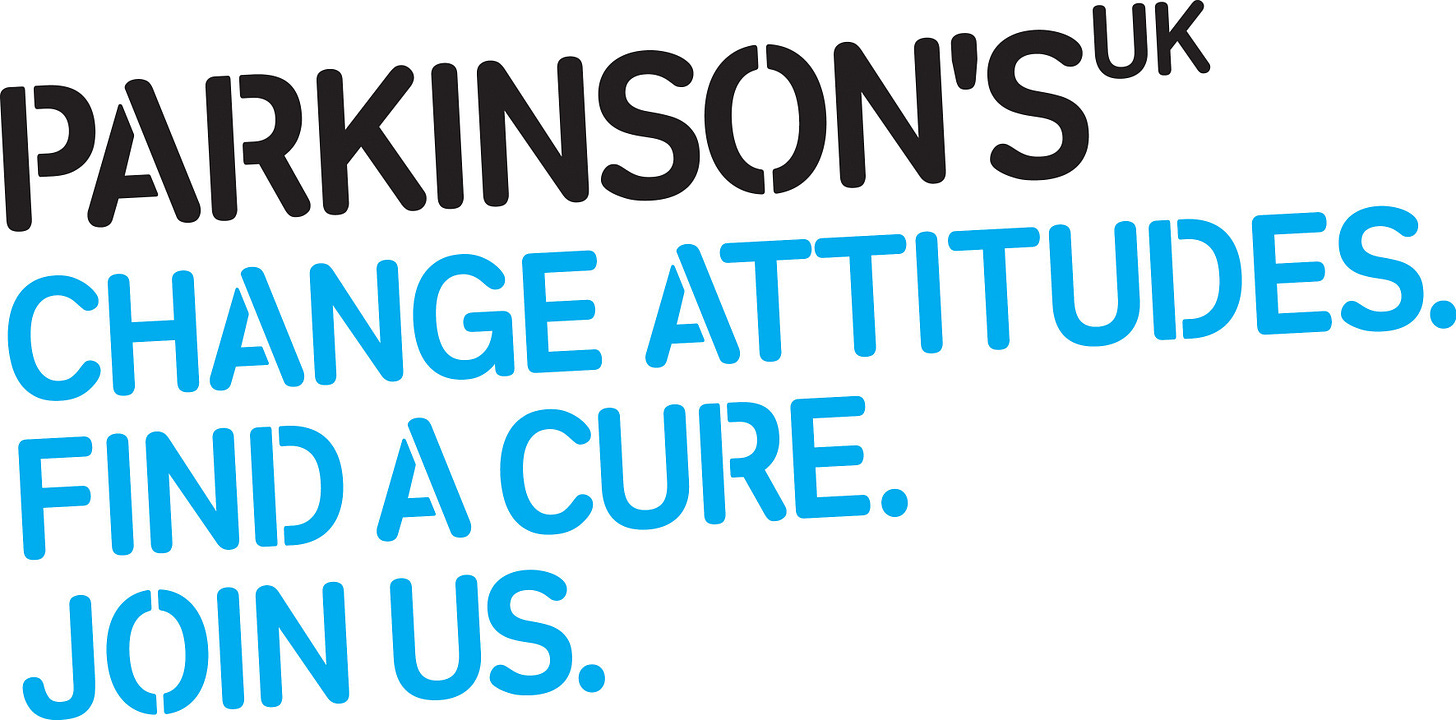How one man's Parkinson's diagnosis inspired him to his greatest running achievements
Since being told he had the condition, Gary Shaughnessy has raised almost £100,000 for Parkinson's UK, beaten his marathon PB and completed the world's hardest triathlon
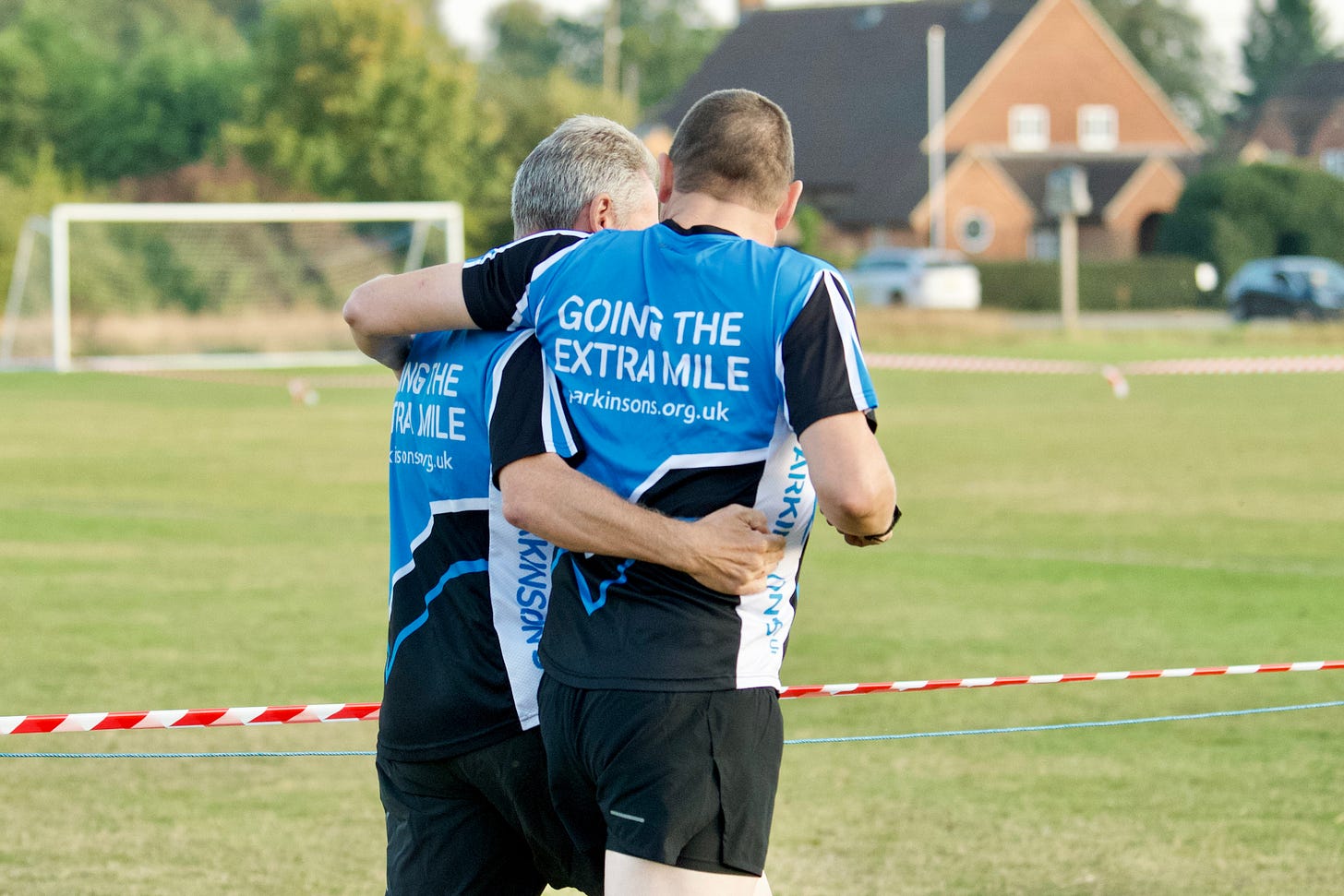
When Gary Shaughnessy was diagnosed with Parkinson’s in 2015 he thought he’d have to stop running.
He was wrong.
Since then, Gary has completed a host of marathons - including recording a new personal best - and the ‘hardest triathlon in the world’.
In the process, he has been named Chair of the Board of Trustees at Parkinson’s UK and raised over £94,000 for the charity.
So much for life-limiting.
Gary told the Running Tales Podcast that when he was first diagnosed after seeing a consultant about a tremor, he “didn’t really understand” what Parkinson’s was.
“I was 48 at the time and thought Parkinson’s was something you get in your 70s,” he said.
“It took a little while for me to actually understand what it was.
“There’s a real assumption that as you have a neurological, degenerative condition then you are just going to degenerate.”
Gary, who had only stopped playing football three years earlier and still considered himself to be pretty fit, assumed, “I would have to give up sport or not really be able to progress with it.
“That was a really dark time for a while, where I thought everything was going backwards, whether it was to do with work, the impact on friends, family, and sport - which I love and is a big part of my life.”
‘You could run last week, so you can run this week’
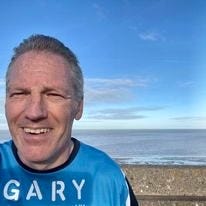
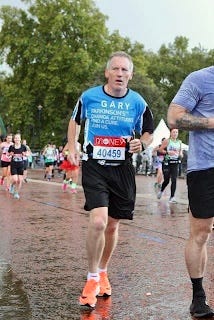
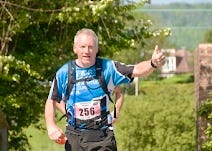
It was the combination of an already entered Barcelona Marathon on the horizon and some words of advice from his wife, Janet, that persuaded Gary to move forward.
“My wife was also brilliant about it,” he said. “I had been out on a training run and really struggled, and I rang her from Portugal - where I was with business - and said I think I’m going to have to give up on this.
“She just said focus on what you can do, don’t worry about time, you could run last week, so you can run this week.
“That was a big turning point for me.”
Gary duly trained for and completed Barcelona - although Janet has never let him forget that she beat him.
“It was a massive emotional release [finishing that first marathon after diagnosis],” he told Running Tales.
“The only real problem was Janet ran the marathon as well. I crossed the line first, but she got a better time than me as she was in the group behind starting. She’s never going to let me forget that.
“Everything started from there. It got me thinking I could do more, and that I also had a role to play to make sure people realise Parkinson’s doesn’t have to stop you doing anything.”
Medicine older than the Moon landing
At the time, Gary was the chief executive of Zurich in Europe, a position he said that gave him a profile to speak out about Parkinson’s and to raise money to support research into the condition.
“The medication most people use for Parkinson’s was originally devised in the 60’s before Neil Armstrong made it to the Moon.
“There’s a huge amount that can be done to help improve the quality of life of people with Parkinson’s and hopefully to search for a cure.
“There’s 18,000 people in the UK get diagnosed every year and we need to do something to try and stop there being anyone diagnosed with Parkinson’s, or having to see it as something they can’t solve.”
Since conquering Barcelona, Gary has taken part in a host of challenges, with his marathon total now approaching 40.
His endeavours include completing London alongside his three children, running the Jungfrau Marathon that climbs 5,960 feet (1,340m), becoming a Guinness World Record holder and - perhaps most incredibly - finishing the gruelling Arc to Arch Triathlon.
Taking on the ‘hardest triathlon’
Dubbed the ‘hardest triathlon in the world,’ the Arch to Arc runs from London’s Marble Arch to the Arc de Triomphe in Paris.
The event traditionally consists of running 87 miles from London to Dover, swimming the English Channel and then cycling the remaining 181 miles to Paris.
Gary - who somewhat self-deprecatingly calls his swimming ability “pathetic” - opted to row the Channel rather than swim it.
The fact he had never rowed before he decided to take on the event didn’t stop him.
“What made me want to do it is that a guy who was raising money for Parkinson’s, as his father had it, was doing it when I first got involved with the charity,” he said.
“I thought it was brilliant.”
Also on Running Tales:
Super Mario - The Ironman who always finishes with a smile on his face
Running to show the humanity behind every blanket - the story behind the 16:15 Charity Run
Gary, who had not previously run further than “a couple of ultras at 50k,” even stopped in the middle of the run to speak to a group of school children about the challenge.
He said: “I was 57 miles in, stood in front of a load of kids telling them why I was doing this run, and I was sufficiently tired that I couldn’t explain it.
“So we ended up doing a run twice round the school playing field, which just added to the distance I had to do and not to my chances of getting to Dover in a fit state.
“But I loved having the conversation with the kids. It gave me a huge amount of energy.”
Finishing the event provided another unusual moment.
“I thought, ‘have I actually done that, have I completed it’?,” he said.
“The point that was most powerful was about 10 miles from Paris. We came over the top of a brow and you could see parts of Paris.
“It wasn’t an anti-climax when I finished, but I hadn’t really believed I was going to get there and it was ‘what’s next, what do I have to do next?’”
What is Parkinson’s?
Parkinson’s is a progressive neurological condition for which there is currently no cure.
The condition develops when nerve cells responsible for producing a chemical known as dopamine die. Dopamine allows messages to be sent to the parts of the brain that coordinate movement.
With the loss of dopamine-producing nerve cells, these parts of the brain are unable to work normally, causing symptoms of Parkinson's to appear.
In the UK, around 145,000 people are already living with Parkinson’s. With population growth and ageing, it is estimated this will increase by a fifth, to around 172,000 people in the UK, by 2030.
Marathon running, meanwhile, has remained a constant, with the Jungfrau Marathon proving “particularly tough”.
“It was incredible actually, it was about 25kms pretty much flat and then 17 or 18kms straight up the side of the Jungfrau.
“Marathon running has been a great way to see different parts of the world. I ran New York for example.
“I used to go on business to New York, and when you run it you see a completely different city.”
Three-legged running with a mannequin called Basil
And when it comes to completely different, not much can beat Gary’s - successful - attempt to add a world record to his CV.
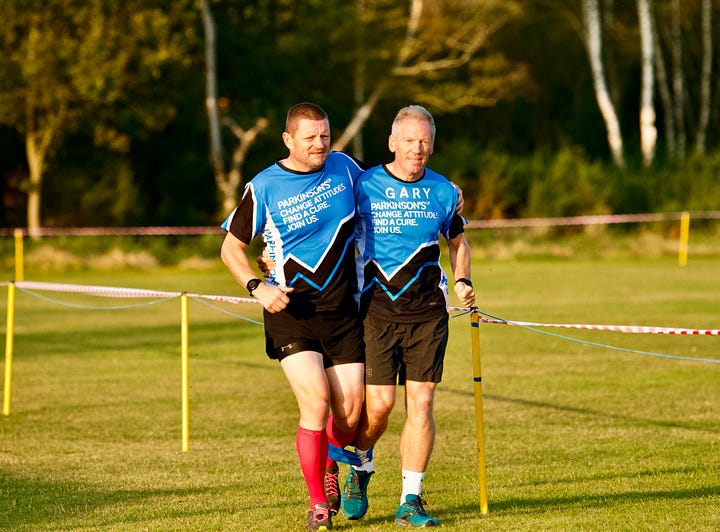
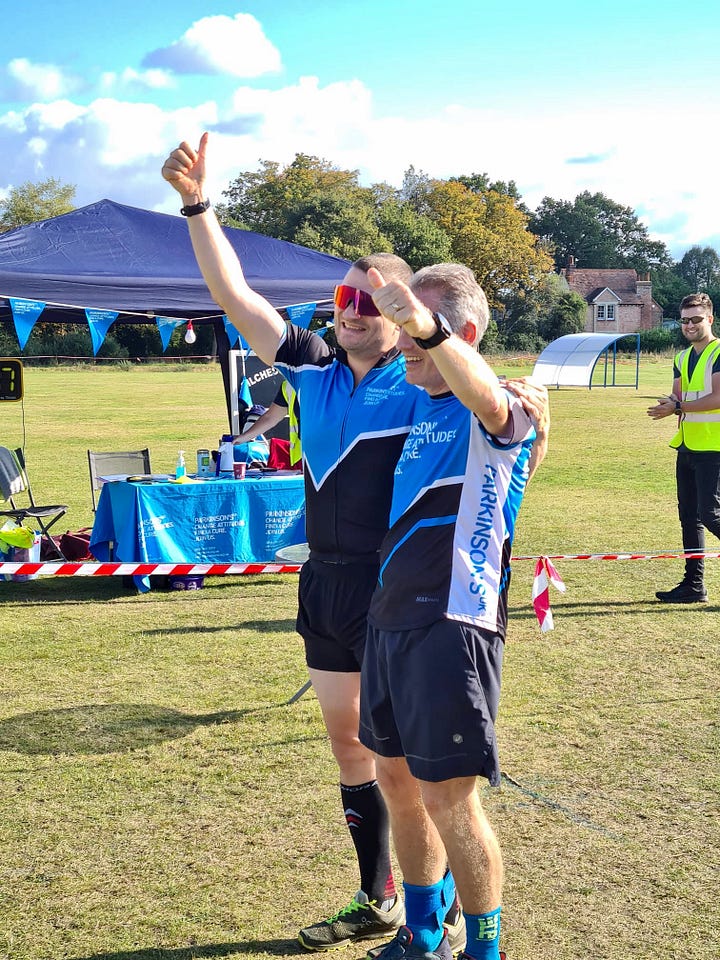
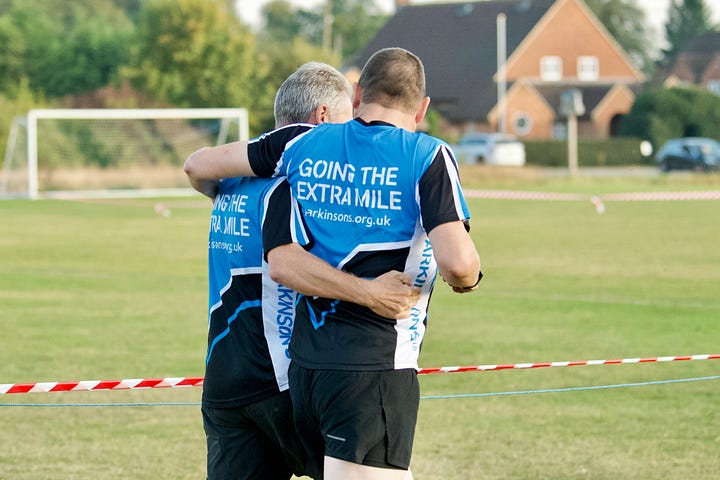
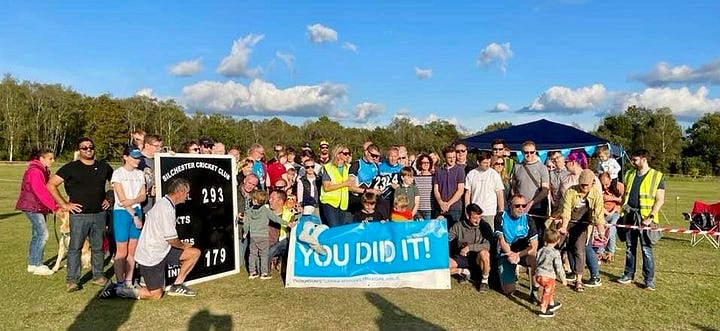
Along with his friend, Andy Tucker, Gary decided to attempt to beat the record for the further distance run three-legged.
Their first effort - in October 2020 - couldn’t go ahead as planned due to the impact of coronavirus, so instead the pair created their own challenge completing 300 laps of their local village green over 24 hours.
In all they ran 76.5 miles (123.18km), with the dubious assistance of a mannequin called Basil, who was strapped between them to make sure they complied with Covid social distancing guidelines.
The following year they tried again, covering 72.7 miles (117.1km) in 24 hours to beat the previous world record.
And this year Gary has another set of challenges to face.
He has already swam four kilometres from Nevis to St Kitts, and last week took on the Paris Marathon.
Further marathons are set to follow in quick succession in Newport and Madrid, followed by two cycle rides.
The first will see him travel from Liverpool to Ukraine - with Zurich having agreed to match the funding donated for Parkinson’s UK with a further donation to a mental health charity for refugees from Ukraine.
And in July, he will ride from Dover to Barcelona for the World Parkinson’s Congress.
Exercise classes and later life care - where the money goes
Although Gary has stepped back from his chief executive role at Zurich, he now chairs the company’s charitable arm, the Z Zurich Foundation.
He has also taken on a role as the chair of England Athletics and, in 2018, he became Chair of the Board of Trustees at Parkinson’s UK.
Running Tales and women’s safety:
Our recent look on women’s safety when running raised some important discussions topics.
The following articles and podcast examine subjects including victim blaming, what needs to be done to improve safety - and by who, and whether women should arm themselves while running:
Along the way Gary has raised more than £94,000 for the charity - money which is spent on both research and to provide care.
“A lot of it is on care,” he said. “That can be exercise classes, speech therapy, later life care - which is unfortunately a sizeable amount.
“One of the things we do through the charity is to support Parkinson’s Nurses, who are specialists. Ultimately, they can end up being paid for by the NHS when we can prove the case for them.
“When I first spoke to a Parkinson’s Nurse it was the first time anyone really gave me an empathic view of what Parkinson’s could be like and how I could take the next step.
“There are so many different symptoms of Parkinson’s - there’s over 40 - and everyone has a different version of Parkinson’s.
“If you are not careful you will assume you are going to be the same as the next person, and that can lead you into real depression or you can convince yourself there is a miracle cure out there just one click of a button away.
“The answer is neither of those I’m afraid.”
‘The beginning of a new life’
Despite the challenges he faces, Gary is determined to keep moving forward and proving that Parkinson’s does not define him or form a barrier to incredible achievements.
“It’s not the end of life. It’s the beginning of a new life,” he said.
“A degenerative condition, whether Parkinson’s or other conditions, can take a long period of time.
“You don’t have to say tomorrow, that’s it, you’ve gone from being healthy and active to not being healthy and active.
“The second thing I would say is do what you can to put yourself in control. Medication can help, but doing sport, running or whatever else it is, and looking at diet can make a big difference.
“I don’t think you should exclude yourself from the rest of society just because you have a condition like this.
“The worst thing you can do is put a ceiling on yourself and say ‘I can’t do this anymore, I can’t sprint or I can’t do marathons’ because you will prove yourself right.
“The evidence is sport and physical activity is really good for Parkinson’s. It is one of the few things that helps slow the condition down.
“I did my best marathon time in Berlin last September.
“I may need to make sure I take my pills at the right time and my sleep is appalling, as is the case with a lot of people with Parkinson’s, but it’s not stopped me doing the running that I love and each year doing something more and more demanding.”
Find out more:
Anyone concerned they may have Parkinson’s should see their GP. Getting information about the condition and finding support can be a huge help for people who are diagnosed.
Support is available for anyone affected by Parkinson’s on the Parkinson’s UK website and via the free, confidential helpline, 0808 800 0303, and online forum.
Thanks as ever for reading and listening to Running Tales. We couldn’t do this without your support - please back us to keep going by…





